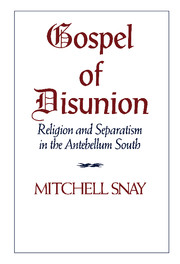Book contents
- Frontmatter
- Contents
- Acknowledgments
- Introduction: Religion and the search for Southern distinctivenes
- PART ONE RELIGION AND SECTIONAL POLITICS
- PART TWO RELIGION AND SLAVERY
- PART THREE RELIGION AND SEPARATISM
- Conclusion: Religion, the origins of Southern nationalism, and the coming of the Civil War
- Bibliography
- Index
Introduction: Religion and the search for Southern distinctivenes
Published online by Cambridge University Press: 07 September 2010
- Frontmatter
- Contents
- Acknowledgments
- Introduction: Religion and the search for Southern distinctivenes
- PART ONE RELIGION AND SECTIONAL POLITICS
- PART TWO RELIGION AND SLAVERY
- PART THREE RELIGION AND SEPARATISM
- Conclusion: Religion, the origins of Southern nationalism, and the coming of the Civil War
- Bibliography
- Index
Summary
At noon on February 18, 1861, the Rev. Basil Manly, pastor of the Baptist church in Montgomery, rode to the capitol in a carriage with Jefferson Davis, Alexander H. Stephens, and their military escort. He delivered a prayer later that afternoon that spoke directly to the event – the inauguration of the president and vice–president of the Confederate States of America. “Thou hast provided us a man,” Manly proclaimed, “to go in and out before us, and to lead thy people.” He also invoked God's blessing for the new born Southern nation: “Put thy good spirit into our whole people, that they may faithfully do all thy fatherly pleasure,…” Manly called further for truth and peace in the administration of government and righteousness for the people. He concluded, finally, by asking God to “turn the counsel of our enemies into foolishness.”
Present at Manly's benediction were the politicians who had brought the South to the brink of separate nationhood. Taken together, they embodied the wide spectrum of antebellum Southern politics. William L. Yancey, the fire–eater from Alabama and the leading orator of the secessionist cause, and Robert Barnwell Rhett, the vociferous Southern nationalist from South Carolina and the voice behind the radical Charleston Mercury, were the extremists who had pushed Southerners toward political revolution. Although not as radical as Rhett or Yancey, Davis himself had been a strong advocate of Southern rights as a senator from Mississippi during the 1850s.
- Type
- Chapter
- Information
- Gospel of DisunionReligion and Separatism in the Antebellum South, pp. 1 - 16Publisher: Cambridge University PressPrint publication year: 1993



